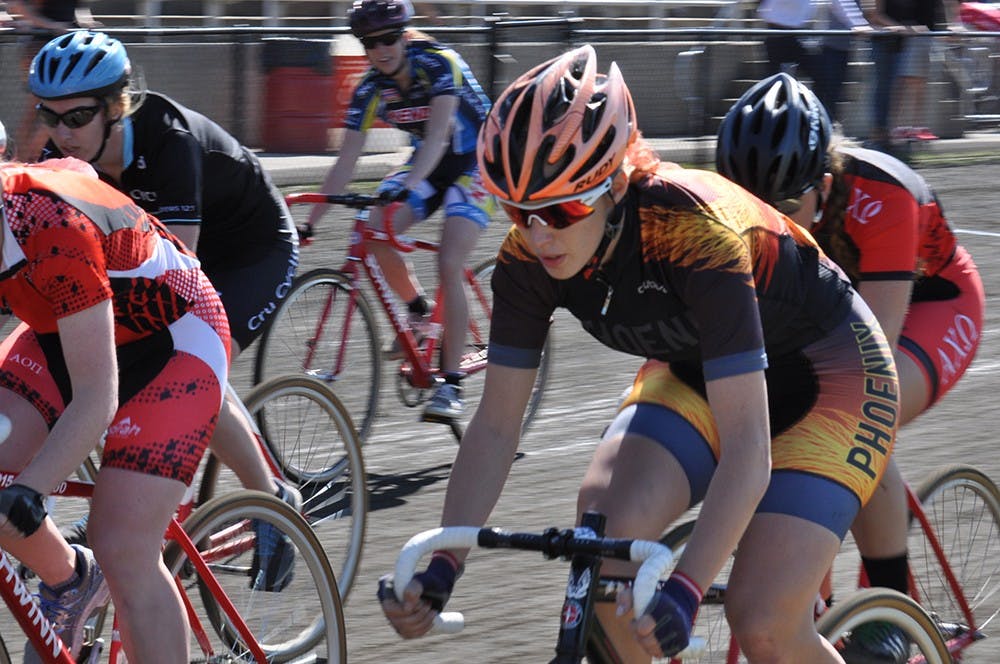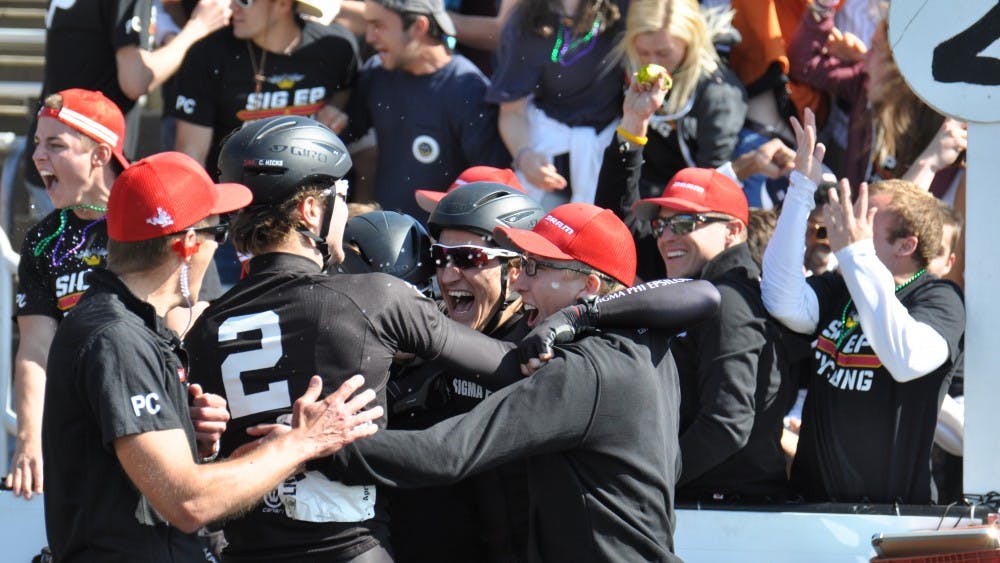A paragraph of black pen fills the underside of her left forearm. It’s her mantra. What does it say?
“No one knows what it says but me,” she says, half-smiling. Sherwood is rarely seen smiling. For awhile her focus intimidated even her teammates -- she was kicked off her team. Now, she’s found a group that understands her.
A few years ago, Sherwood came up with the motto. She’d just had a tough race and was doubting herself as a cyclist. She needed something to motivate her.
Sherwood writes the mantra on her skin before every race. It reminds her to be herself.
“I live by it,” she says.
The writing this time is washed out because it’s two days old, leftover from Individual Time Trials.
Sherwood wasn’t supposed to compete in ITTs. She shouldn’t be racing at all, as she’s just two weeks removed from a wreck that left her with a fractured hip and a mild concussion.
But Sherwood raced anyway. She finished second out of 151 riders.
***
Sherwood began running competitively when she was nine.
A track athlete in high school, she earned scholarships to several small, private schools. But she suffered from serious shin splints her senior year, which kept her from running.
So she chose the one school she didn’t have a scholarship to or a guaranteed spot on the track team, a school she hadn’t even applied to when it came time to graduate from Plymouth High School.
The decision to become a Hoosier left Sherwood without a sport. Because she had always been a runner and swimmer, Sherwood’s longtime running coach Jami Holm forced her to get on a bike, too. It was the third dimension of the triathlons Holm spends much of her time training for.
Sherwood decided she would do the same. In her first triathlon, she qualified for nationals.
As Sherwood and Holm spent more time cycling together during the summer, both training for triathlons, Holm began to realize how good Sherwood was on the bike and insisted she find a Little 500 team.
Sherwood found Collins Cycling, an independent team.
A race she originally had no interest in was a breakthrough for Sherwood into the cycling world. The physicality of the race was no issue for someone as physically fit as she was. And the bike exchange — maybe the most difficult element of the race — had become muscle memory for Sherwood as she transitioned from swimming to cycling over and over during triathlons.
Now, cycling is a sort of addiction for her. Sherwood is up at 5 a.m. each morning to train. It’s unusual to go a day without a trip, or two, to the track.
“You don’t find people like her very often,” teammate McKayla Bull said. “She lives and breathes bicycles, and it’s beautiful. This is her home.”
***
Tabitha Sherwood doesn’t make good first impressions.
She went to a private Catholic school growing up, where she was taught not to speak.
“I’m not articulate,” Sherwood said. “So I guess I stay quiet and look pissed all the time ... I have really bad resting bitch face.”
She’s been working on smiling for years, she said, but it’s never stuck. Bull and Sherwood, who met last year when they both raced for Collins, became best friends. Sherwood taught Bull everything she knows about Little 500, racing and being mentally and physically strong.
Sherwood’s strength, Bull said, is misinterpreted as intimidation. She’s often misunderstood on and off the track.
“I don’t find her intimidating,” Bull said. “But 99 percent of the people out here do. My mom kind of described her as a badass who doesn’t really care what other people think. She’s out here for her.”
After two years riding for Collins, Sherwood was asked to leave the team in September 2014. Sherwood’s competitiveness was off-putting to some members. Simply finding another team wasn’t an option — that would leave her ineligible to race this year.
Little 500 transfer rules work the same as NCAA transfers. If Sherwood joined a pre-existing team she would have to sit out a year.
It didn’t seem fair to Sherwood. She didn’t choose to leave her old team but was forced to, so why shouldn’t she be allowed to race?
She protested the decision. Thirteen other Little 500 teams, including some men’s teams, followed suit. They wrote letters of support for Sherwood.
“That’s something that’s so amazing because when you’re one of the top competitors that people see as a threat, it’s not very often that they’ll support you and want you to race,” Sherwood said.
McKayla Bull was the only one of eight Collins riders to stand up for Sherwood.
“I would not be here today if it wasn’t for her,” Sherwood said of her best friend. “She believed in me when I didn’t believe in me.”
In late October 2014, Sherwood found she would have to form a completely new team to race. Bull joined Sherwood, who then recruited Clara Butler from Army, a team that dissolved after last year, and Butler brought a friend, Jenna Degner-Lopez. All of them had past experience riding, but now they had to learn to ride together.
“At first it was like we’re a group of misfits thrown together,” Bull said.
Sherwood has a poster hanging on the ceiling above her bed. It’s a picture of a phoenix, a symbol of motivation for her.
When Sherwood and her teammates were deciding on a team name, the poster came to mind. “It kind of worked,” she said, “because we’re trying to find this fire inside to motivate us.”
The Phoenix is a bird from Greek mythology that rose from the ashes with renewed youth. It was reborn, just like Sherwood and her new team. They added a fitting catchphrase to go with the name.
“Rising from the cinders.”
***
Sherwood has learned that crashes are just a part of the sport. But she had never seen anything like what happened March 22.
It’s still hard for Sherwood to talk about.
“I’m still dealing with some PTSD from it,” she said.
She was racing at Lindsey Wilson College in Kentucky. They weren’t even two miles into the race when a girl at the front of the pack began rubbing wheels and bumping into other riders as they headed down the first descent. When that rider went down, five or more others went down with her.
Sherwood was at the back. “There was no way I could avoid it because there were bikes and bodies all over the road,” she said.
She managed to maneuver around four riders before wrecking. As she went down, she heard a loud moaning sound coming from behind her.
“It sounded like they were dying,” she said. “That sound still actually haunts me.”
With six years of first-respondent training, Sherwood rushed over to try to help. The girl couldn’t speak. She was bleeding out of her ears, nose and mouth, and she groaned at the touch of a hand to any part of her body. Sherwood tried to keep her warm and stable and limit the bleeding until the ambulance arrived.
It wasn’t until the next day she realized just how bad her own injuries were. She couldn’t put any weight on her hip. It was nearly impossible to move her head or neck, and she couldn’t think straight because of her concussion.
As badly as she was injured, Sherwood said she got off lucky. The other rider was in a near-death situation and suffered from a fractured skull. Nearly a month later, Sherwood still thinks about the incident.
“She saw someone close to death doing the thing she loves most,” Bull said.
In the weeks after the crash, Sherwood’s teammates encouraged her to take time off training, maybe skip the Spring Series events so she would be ready come race day. The only thing that could heal a fractured hip is time.
She raced anyway. With her help, Phoenix earned a seventh-place finish at qualifications, and Sherwood finished second individually in both ITTs and Miss-N-Outs.
Racing didn’t hurt her hip, she said. It made it feel better.
***
Back in October when Sherwood was assembling her new team, she wanted it to be an independent women’s team that would be around for a while.
“Not necessarily winners,” she said, “but a lasting team, a legacy.”
So Sherwood pushed her teammates as hard as she pushes herself to establish a precedent for Phoenix Cycling. Bull considers herself a motivator, but she’s never been pushed to her limits as far as Sherwood makes her go.
“Tabitha is an absolutely tenacious leader,” Bull said. “She is incredibly strong. Because she never settles, it makes her the best.”
The Little 500 is just a stepping-stone to what Sherwood hopes to make a professional career.
“If I have a chance to chase my dream, I’m going to rather than be stuck wondering ‘what if’,” she said.
On race day, in its first year as a team, Phoenix will wear silver. Sherwood is the easiest to spot in her bright orange helmet. She’ll be the first rider on the track.
Bull called Sherwood one of the best individual cyclists to ever ride in the Little 500.
When she races, it looks almost effortless. Sherwood is solid. She’s steady and unwavering. She’s in a zone.
And if she ever feels as though she’s slipping, she’ll glance down at what’s written on her arm.






